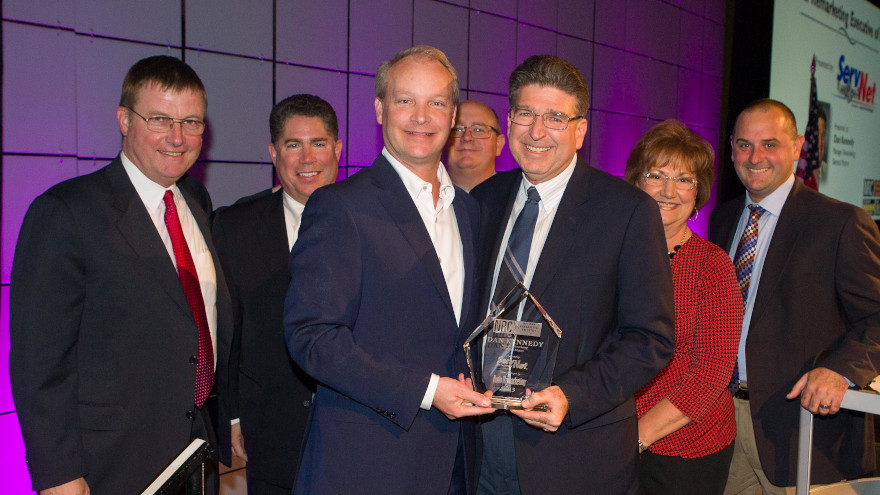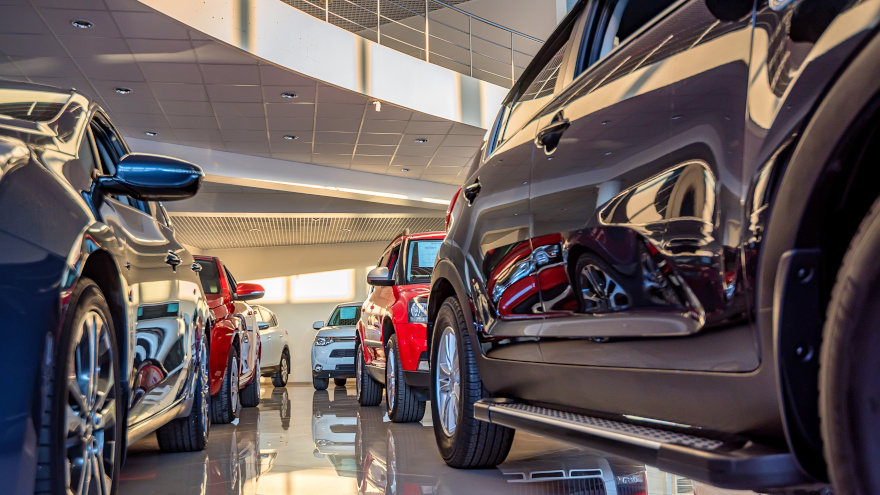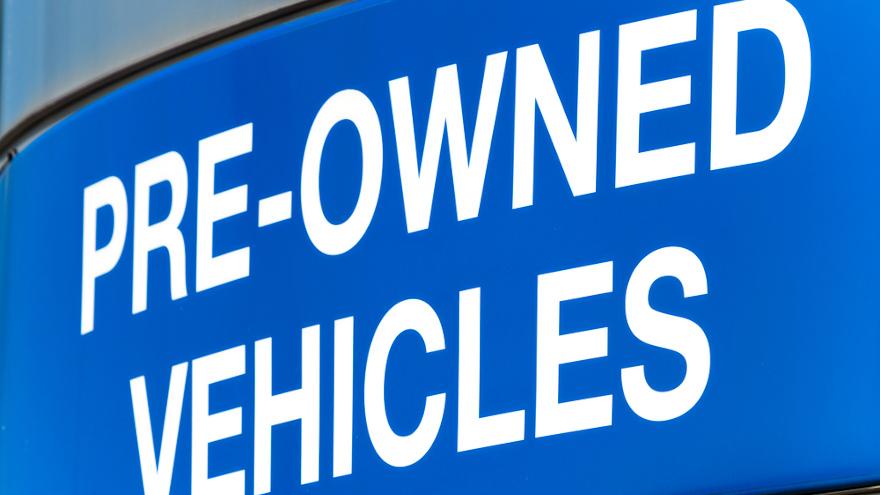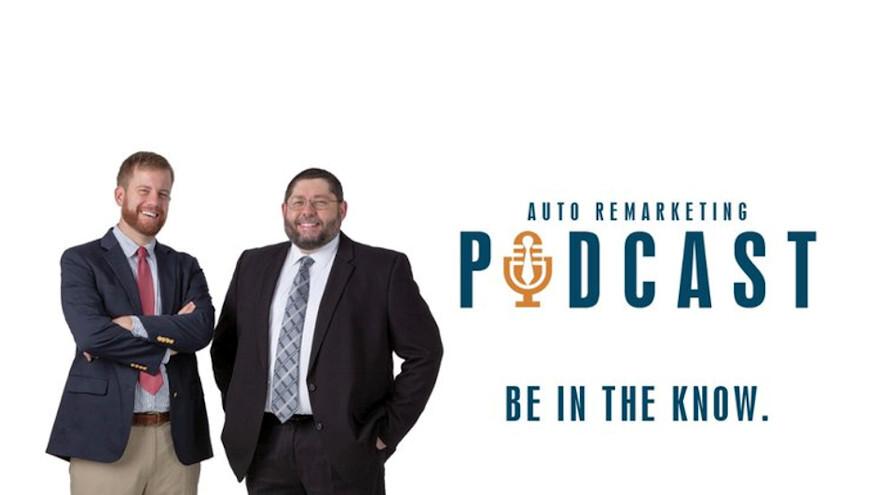Dan Kennedy, senior vice president of business development at Jack Cooper Diversified, chats with Cherokee Media Group president Bill Zadeits about the state of the wholesale auto industry, challenges dealers are facing, key elements of weathering past auto industry crises and more.
Kennedy spent four decades with General Motors, including 31 years with the automaker's remarketing organization.
He became manager of GM Remarketing in 2010, where he has led the company’s U.S. remarketing activities.
In 2013, Kennedy was Cherokee Media Group's first-ever National Remarketing Executive of the Year honoree.
“Ups” likely aren’t just walking through the dealership showroom doors now that COVID-19 has impacted so much of daily life.
In this episode of the Auto Remarketing Podcast, AutoFi head of digital retail Joe St. John described how some dealers have basic fundamentals in place for a smooth digital retailing process or, conversely, understand they need assistance quickly to remain viable during the coronavirus pandemic.
To listen to this episode, click on the link available below, or visit the Auto Remarketing Podcast page.
Download and subscribe to the Auto Remarketing Podcast on iTunes or on Google Play.
AutoFi also hosted a series of informational webinars about these subjects. The recordings are online here.
Used-car sales remain a bright spot for many dealers, but it could become challenging for them to get their hands on enough pre-owned supply, said panelists in a LotLinx webinar on Wednesday.
In a Weekly Market Update distributed Tuesday, LotLinx dissected used-car trends as of Monday night, indicating that there was a slight slowing in the pace of growth. However, used-car sales were up 14.4% from the pre-pandemic pace, LotLinx said.
“Early on in the pandemic, there was a lot of consternation about what’s going to happen with used,” LotLinx chief executive officer Len Short said in the webinar, which also included eDealer Solutions president Jennifer Suzuki and Mike Maroone Chevrolet South president and general manager Robert Farnett.
“I know a lot of dealers, they don’t want to be holding a lot of used inventory through a tough sales period, so they cleared their lots of used inventory,” Short said. “But the darkhorse here has been used-car sales. It continues to run up.”
And that’s not always the case when the new-car market has such high incentives, including automakers running zero-percent deals for extended terms.
“Usually in an incentive environment like this, new sales become far more attractive and used sales lag, but that’s not what’s going on here,” said Short, who is among the speakers on tap for next month's AIS in Advance virtual conference on automotive innovation.
But that used-car momentum comes with a challenge: competition for inventory.
Pre-owned “continues to be a very strong marketplace,” Short said. “Everybody has recognized that and now it’s a scramble for inventory.”
Farnett sees the same used-car strength, but also the potential supply challenge.
Mike Maroone Chevrolet South is located in Colorado Springs, Colo., an area that has typically had a “very strong used-car market,” due to economic insulation that comes with having a strong base of military personnel in the area, Farnett said.
“We’ve been very, very blessed to see our used-car business continue to be strong. At our store, we’re a 2-to-1 and there have been times we’re a 3-to-1, used-car- to-new (sales ratio),” he said. “I think the challenge that we’re going to face, especially as a General Motors dealer, is inventory.
“And it’s not just General Motors, but I think GM was hit harder because in the third and fourth quarter of last year, we dealt with a strike and that strike impacted our inventory flow,” Farnett said. “And then we were just starting to get the plans cranking again and we had a lot of orders in the pipeline, and then obviously COVID hit.”
The particular challenge that Farnett’s dealership faces is that it gets most of its trade-ins from new-car sales. About 73% of new-car sales for the Chevy store have a trade-in, he said, with about a third of used sales having a trade-in.
“If I look into the future, the biggest concern that I have is being able to acquire the inventory through a new-car trade, which is one of the advantages we have against the competition, is we’re new-car dealers and we’re selling new cars and getting trade-ins,” he said.
“Because if you have to go out and compete on the open market at auctions and through private acquisitions, there’s a lot of competition out there and they’re getting very good and they’re very smart at how to acquire.”
Speaking of acquiring vehicles at auctions, Black Book is one company that tracks that sort of metric.
And in its COVID-19 Market Update released Tuesday, Black Book reported the latest auction results continued to demonstrate strength “as sales were plentiful after the Memorial Day weekend left dealers needing inventory to replenish their lots.”
However, dealers and wholesalers are hitting a variety of inventory potholes.
“Most sellers were holding firm to floors, as demand at auctions has increased due to the strong retail demand being driven by stimulus checks and unemployment benefits. In some cases, we saw buyers and sellers walking away from deals over as little as $100,” Black Book said.
“At many auction locations, the supply available for sale is still down as staffing reductions have left them unable to process vehicles as quickly as needed. Many vehicles are still receiving little or no reconditioning,” Black Book added.
Nick Zulovich contributed to this report.
Black Book representatives are seeing and hearing a wide array of stories from auctions and dealerships, and the firm gathered up the best ones to include with its latest wholesale pricing information for its latest COVID-19 Market Update released on Tuesday.
From only $100 derailing some wholesale transactions to stores getting concerned about inventory — especially on the new-car side — these anecdotes filled the latest Black Book update, which began with analysts offering a grim projection about the automotive marketplace as the warmest weather of the year officially arrives.
“As we enter the summer months, we expect wholesale and retail prices to deteriorate. We attribute this projected decrease to the large influx of incremental used inventory expected to hit the marketplace, the weakening of retail demand due to the deep recession and corresponding unemployment numbers,” Black Book analysts said in their latest update.
That projection arrived as Black Book noticed wholesale values actually rose last week.
According its volume-weighted data, analysts indicated overall car segment values increased by 0.21%. Black Book noted most car segments experienced increases or stability, except for sub-compact car, prestige luxury car and premium sporty car.
“Prestige luxury car and premium sporty car segments have higher MSRPs, so it is typical to see them depreciating this time of year,” analysts said.
Black Book also pointed out the compact car segment generated the largest value increase for the third consecutive week, rising 0.59% last week after jumping 0.72% the week prior.
Meanwhile in the truck world, Black Book’s volume-weighted data showed overall truck segment values — including pickups, SUVs and vans — edged up by just 0.04% last week.
Analysts mentioned values the small pickup segment increased for a second week in a row. Then they elaborated about full-size trucks, which have shown slowed depreciation in recent weeks before inching a smidge higher this past week (up 0.01%).
“This is a segment that has seen increased demand on the new side due to the attractive incentives such as 0% for 84 months,” Black Book said. “And as dealers sell a large portion of their new-car inventory, dealers are stocking up on used units in preparation for delays in new inventory shipments caused by months of production shutdowns.”
And evidently dealers weren’t just scooping up full-size trucks through their wholesale options. Black Book reported the latest auction results continued to demonstrate strength “as sales were plentiful after the Memorial Day weekend left dealers needing inventory to replenish their lots.”
However, dealers and wholesalers are hitting a variety of inventory potholes.
“Most sellers were holding firm to floors, as demand at auctions has increased due to the strong retail demand being driven by stimulus checks and unemployment benefits. In some cases, we saw buyers and sellers walking away from deals over as little as $100,” Black Book said.
“At many auction locations, the supply available for sale is still down as staffing reductions have left them unable to process vehicles as quickly as needed. Many vehicles are still receiving little or no reconditioning,” Black Book added.
Turning next to what Black Book heard from dealers, the stories reinforced what experts at Cox Automotive, ALG and others reported about May sales.
“During one of our dealer meetings, a dealer told us that he sold 100 units over the three-day weekend, which was significant considering his typical per monthly sales volume averages around 600 units,” Black Book analysts said.
Also on the used front, Black Book recapped that demand remains strong for vehicles below $10,000, typically retailed at independent and buy-here, pay-here dealerships.
“The primary driver they are seeing for increased sales has been stimulus checks and the supplemented unemployment benefits from the federal government,” analysts said. “However, there is great concern in this community that once the benefits return to pre-COVID–19 levels, they will be forced to repossess many of the vehicles they recently retailed.”
Finally, Black Book’s conversations with franchised stores revealed other concerns relevant to those particular dealerships.
“New demand continues to be fueled by the enticing new car incentives. However, it is leading dealers to be concerned about new-vehicle inventory levels,” analysts said. “Another dealer mentioned that if business continues as it has been, he will be out of new truck inventory early this month.
“Dealers are anxiously awaiting new-vehicle deliveries,” they continued. “Currently, deliveries are few and far between as the supply chain and assembly lines face challenges in resuming production and deliveries are only arriving from inventory produced prior to the shutdowns.”
UPDATED to include analysis/data from LotLinx.
Recapping used-vehicle sales from May shows a bit of a mixed bag. The month appears to have been much stronger than April, but hit a speed bump the final week.
There was a 20.7% year-over-year decline in used-car sales the final week of May, according to Cox Automotive.
“Like in new, used sales also ran into a tough comparison, and our prior-week numbers were revised down substantially,” Cox Automotive chief economist Jonathan Smoke said in a video update on Tuesday.
He later added, “As we got to the end of May, we ran into some much tougher comparisons to 2019, and so our estimates for both new- and used-vehicle sales lost some ground in the recovery.”
A week ago, an ALG forecast indicated that used-car sales for May were likely to be about two-thirds of what they were a year ago, but more than double the total from April.
The forecast had called for 2,342,597 used sales for May.
That would mark a 34% year-over-year dip but a 116% month-over-month gain, ALG said.
In a Weekly Market Update distributed Tuesday, LotLinx dissected used-car trends as of Monday night, indicating that there was a slight slowing in the pace of growth. However, used-car sales were up 14.4% from the pre-pandemic pace, LotLinx said.
On a more granular level, Lithia Motors saw “notable improvements” throughout its operations last month, including some impressive gains on the used-car side that brought the retailer’s pre-owned sales back to pre-pandemic levels in the last week of May.
Lithia’s same-store used-vehicle sales in May were up about 8% year-over-year, the company said in a news release Tuesday.
Same-store used-vehicle sales were down about 5% during the first week of May, but were up 22% year-over-year the final week of the month, Lithia said.
The used-car sales gains last week at Lithia were representative of “the strong levels achieved for the first two months of 2020 and prior to the pandemic,” the retailer said.
Over at PureCars, the company’s data indicated that 10 of the country’s 15 best-selling vehicles the week of May 22-28 were used models, as shown below:
1. Ford, F-150, Used
2. Ford, F-150, New
3. Chevrolet Silverado, Used
4. Ram 1500, Used
5. Toyota Rav4, New
6. Chevrolet Silverado, New
7. Honda CR-V, New
8. Ford Escape, Used
9. Jeep Grand Cherokee, Used
10. Chevrolet Equinox, Used
11. Toyota Camry, Used
12. Toyota Corolla, Used
13. Nissan Rogue, Used
14. Nissan, Altima, Used
15. Ram 1500, New
Automotive Personnel founder Don Jasensky made his Auto Remarketing Podcast debut, leveraging his 30 years of experience at running his own executive search firm to offer recommendations for dealerships and finance companies welcoming back their furloughed employees as well as for workers who are returning either remotely or in person.
The National Automotive Finance Association board member also touched on parts of the industry workplace that might have changed permanently because of the coronavirus pandemic.
To listen to this episode, click on the link available below, or visit the Auto Remarketing Podcast page.
Download and subscribe to the Auto Remarketing Podcast on iTunes or on Google Play.
How does managing health and safety happen at a large corporation during a pandemic, with so many varieties of enterprise?
Kenny Jones, senior director of health and safety at Cox Automotive, joins the Auto Remarketing Podcast to talk about just that. He discusses collaboration in health/safety efforts in the various entities of parent company Cox Enterprises, nuances in protocols for Cox Automotive's various properties and more.
Plus, Jones offers insight on what will be considered in re-opening physical sales at Manheim auctions.
To listen to this episode, click on the link available below, or visit the Auto Remarketing Podcast page.
Download and subscribe to the Auto Remarketing Podcast on iTunes or on Google Play.
New information released by Cox Automotive and J.D. Power on Wednesday and Thursday provided further evidence that the wholesale market is continuing to rebound from the depths of coronavirus pandemic declines.
Both firms disseminated data collected through the midpoint of the Memorial Day holiday weekend, showing wholesale prices and supply each getting on surer footing.
Cox Automotive Jonathan Smoke noted that average wholesale prices for model year 2017 vehicles increased 1.6% year-over-over as of Sunday. Meanwhile, Smoke mentioned in his latest video update that retail prices for those specific units declined only 0.1% based on the same comparison
“So we’re seeing the big disconnect closing between retail and wholesale prices,” Smoke said during the video.
Smoke pointed out that wholesale supply and the used inventory on dealer lots are both improving, too.
Smoke recapped that Cox Automotive’s estimate of retail used-vehicle supply peaked at 115 days on April 8. He pegged normal used retail supply at about 45 days.
“It was down to 36 days during Memorial Day weekend,” Smoke said.
Meanwhile, Smoke noted that Cox Automotive’s information showed wholesale supply peaked at 149 days on April 9 when normal is just 23 days.
“It was down to 41 days on Memorial Day,” he added.
Meanwhile over at J.D. Power, vice president of data and analytics Tyson Jominy compiled the firm’s latest wholesale market update, noting that wholesale auction prices improved for the fifth consecutive week
J.D. Power determined those prices rose 2.3 percentage points for the week ending May 24. Jominy pointed out that prices have improved 11.2 percentage points during the past five weeks and are now down only 2% from the pre-virus forecast for the week ending May 24.
“This represents a substantial improvement from the 16% trough recorded the week ending April 19,” Jominy said in the update. “While the rate of improvement is expected to slow due to an anticipated rise in wholesale supply in June and July, auction prices are expected to steadily recover over the remainder of 2020, finishing the year down 2% to 5% versus 2019.
Also of note, Jominy mentioned that direct to dealer prices “continue to exhibit stability with prices essentially unchanged for the fifth consecutive week.” Since the beginning of March, prices with that specific wholesale segment are off by just 5%, according to J.D. Power data through the week ending May 24.
As far as hammers coming down at the auction, J.D. Power said wholesale auction sales surpassed 91,000 units the week ending May 24, just 11% below the pre-virus forecast for the week.
Jominy also indicated wholesale auction sales have totaled 534,000 units since mid-March, a decline of 609,000 units versus the same period in 2019 and a loss of 517,000 units compared to pre-virus expectations.
“While wholesale auction prices are rapidly approaching pre-virus exceptions, prices will likely exhibit volatility moving forward as dealers replenish retail inventory, an influx of off-lease and off-rental units enter the market and economic headwinds impact consumer demand,” Jominy said.
Late on Thursday, TrueCar initiated a workforce reduction impacting 219 positions, accounting for more than 30% of the organization.
According to a news release, TrueCar explained the action came as a result of two circumstances impacting the company. First, the company made the move in anticipation of the termination of its partnership with USAA Federal Savings Bank later this year.
TrueCar then noted the timing and scope of the reduction were accelerated by the impact of COVID-19.
As part of the workforce reduction, the company expects to reduce annual expenses related to headcount, excluding stock-based compensation, by approximately $35 million.
Back in February, TrueCar announced that it entered into a short-term agreement to extend its partnership with USAA Federal Savings Bank to continue to power the USAA Car Buying Service through Sept. 30.
That February announcement also mentioned that USAA FSB will pay a $20 million transition services fee to TrueCar.
“USAA has made clear to us that it has decided to stop providing a car buying service to its members later this year in an effort to simplify its business and focus on its core product offerings after a reassessment of its strategic direction, and that this decision was unrelated to the performance of our program or product offerings,” TrueCar president and chief executive officer Mike Darrow said.
In parallel with the workforce reduction, TrueCar also made changes with the intention of better aligning its organizational structure with its strategic priorities. Notable changes include:
1. Formation of new consumer group composed of product, consumer acquisition, consumer marketing and affinity partner teams. This consolidation will encourage cross-functional collaboration and alignment in pursuit of a best-in-class consumer experience.
2. Formation of a new solutions group composed of dealer sales and service, OEM sales and service and ALG. This consolidation will simplify and unify the company’s go-to-market approach.
TrueCar added that Thursday’s announcement does not change the financial commentary management provided on the first-quarter earnings call in early May.
Frost & Sullivan’s recent analysis considered the impact of the pandemic on the automotive sector under three scenarios — gradual containment, severe pandemic and global emergency —resulting in outcomes ranging from steady recovery to recession.
Under the severe pandemic scenario, Frost & Sullivan concluded that OEMs will try to capitalize on China’s early recovery from the pandemic, while overall economic relief measures in the U.S., Germany, France and the U.K. will provide the necessary boost to the market in the post-recovery period.
To tap into opportunities in this COVID-19 recovery era, the firm explained that industry participants should consider the following growth prospects:
— OEMs and dealers should focus on digital retailing and empower customers on their online journeys.
— With the rise of eCommerce, light commercial vehicle (LCV) leasing and rental solutions are gaining traction, especially during the pandemic.
— With increasing epidemic outbreaks (SARS, MERS and COVID), OEMs can ramp up connectivity services, emphasizing the need for health, wellness and wellbeing services within the vehicle.
— Contactless and touchless business concepts will leverage aftermarket opportunities, helping on-demand service models gain further momentum.
Frost & Sullivan arrived at those assertions though its report titled, “COVID-19 Growth Impact Assessment for the Automotive Industry, 2020.”
“Major Asian vehicle manufacturing countries such as China, Japan, and South Korea, which accounted for 40% of global vehicle production in 2019, are on the recovery curve. The other two major automotive manufacturing powerhouses, the U.S. and Germany, are expected to resume production partially by mid-June,” said Vigneshwaran Ramesh, automotive and transportation senior research analyst at Frost & Sullivan.
“Additionally, risk mitigation strategies such as offering financial flexibility and support to the entire ecosystem, including to dealers, suppliers and customers, will help OEMs of the world to revive,” Ramesh continued.
“The impact of the pandemic on the automotive sector will unlock new opportunities for other mobility verticals such as electric vehicles (EV), vehicle leasing, and connectivity solutions. EV sales will experience a medium impact as China will revive fastest from the pandemic with manufacturing plants returning to normal,” Ramesh added.
“Further, new vehicle leasing for the corporate segment is expected to sustain moderate growth, owing to the demand for greater flexibility and short-term contracts, whereas OEMs will emphasize connectivity services to enhance their revenue stream,” Ramesh went on to say.
For further information about this analysis, visit this website.












